It is officially flu season. The dominant strain this season is the H3N2 strain, known to cause more hospitalizations and deaths than other strains. Although the flu shot’s effectiveness cannot yet be calculated, experts are expecting it to be about 30% effective. The severity of this year’s flu has contributed to the ongoing vaccination debate.
Facts about the Flu
Influenza (“the flu”) is a contagious respiratory illness caused by influenza viruses. According to the Centers for Disease Control and Prevention (CDC), every state in the U.S. is seeing widespread virus activity. This is the first time this has happened in the 13 years of influenza monitoring. The vaccination is roughly only 30% effective because the H3N2 strain mutates more than other strains. It has been reported that 30 children have died as a result of influenza in recent months. The CDC has declared the flu an epidemic and is urging anyone who did not receive the shot to do so. Even though the flu season is underway, there are still a few months left. The CDC recommends that everyone 6 months of age and older get vaccinated. Here are the recommended vaccines for this season:
- Standard dose flu shot: Most are given into the muscle, but one is given into the skin.
- A high-dose shot: This is administered to people 65 and older.
- A shot made with adjuvant: This is another shot made for people 65 and older with an added ingredient which creates a stronger immune response to vaccination.
- A shot made with virus grown in cell culture: This shot was developed as an alternative to the egg-based manufacturing process.
- A shot made using a vaccine production technology: This shot does not require the use of flu virus or eggs.
The CDC states the vaccine cannot cause the flu. The vaccinations either contain an inactive virus or one designed to mimic the flu virus. For safety, the vaccinations are closely monitored using the Vaccine Adverse Event Reporting System (VAERS) and the Vaccine Safety Datalink. Although these systems cannot determine if an adverse event was created by the vaccine, it can use its data to determine if further testing is needed.
Anti-Vaccination Movement
Since the inception of vaccine usage, there have always been people who disagreed with the idea of vaccinations. Due to social media groups, politicians, celebrities, and the internet, the “anti-vaccination movement” has seen a steady rise over the past several years.
Public Health Reports study found that families of unvaccinated children are more likely to be:
- Wealthy, with annual incomes more than four times the poverty level
- Non-Hispanic White
- Married couples in English-speaking households
- Educated with college degrees
- Covered by private health insurance
Parents of unvaccinated children are opting out or delaying vaccinations for many reasons. Parents are worried their infant’s immune system is not fully developed. They are concerned there are poisonous ingredients in the vaccinations. Some view the side effects as just as bad, if not worse, than the actual disease. They have concerns that certain vaccinations can cause autism. Many parents have formed a mistrust of the medical community. There is also the belief that forcing immunizations is a violation of rights. Also, similar to the flu shot, many individuals feel that the vaccination is not completely effective and just a way for the medical community to profit.
Proponents of vaccinations have opposing views. Studies show that most people who are coming down with rare sicknesses, such as the outbreak of measles and mumps recently, are people who have not been immunized. These are serious diseases which one can die from. Those who are pro-vaccinations believe that although children are vaccinated against certain diseases, un-vaccinated children are putting vaccinated children with weakened immune systems at risk. The British study which linked childhood vaccines to autism has been bafter an investigation proved the doctor had altered the histories of patients. Lastly, they believe that delaying certain vaccinations can put children at more of a risk to develop seizures.
What Does the Law State?
There is no federal requirement in the U.S. for informed consent relating to immunizations. However, there are vaccination requirements for schoolchildren which varies by state. This does not only pertain to children, as states may require immunization of healthcare workers. View the state-by-state immunizations requirements and medical, religious and philosophic exemptions here.
Some countries in Europe have recently amended their laws. In France, the government has announced vaccination will be mandatory for all children born January 1st or later. If parents choose not to vaccinate, these children will not be allowed in schools or nurseries. Italy has the same mandate; however, parents will be fined if they choose not to vaccinate. In June, Germany introduced a new policy stating that parents had to show proof of vaccination prior to their children entering kindergarten. The prior law said they only had to show proof of vaccination counseling.
In Australia, they offer incentives for parents to vaccinate their children. For example, low-income families can receive tax rebates if their children are up to date with their vaccinations. Children are also mandated to have their vaccinations if they are attending childcare centers or preschool facilities.
Canada lacks a national immunization registry and therefore their vaccination rates may be underestimated. There is no penalty for vaccination refusal; however, they are working on interventions to increase vaccination rates. Some of these interventions include home visits, sending reminders, reducing the distance to clinics, and offering vaccinations at well visit appointments so parents do not have to make an additional trip.
Research This Topic in HeinOnline
Let’s research this topic in HeinOnline to see what is available. Using the Full Text tab on the Welcome Page, enter vaccine* OR vaccination* AND requirement* and click the search button.
Note: The asterisk will search for a word with multiple character differences.
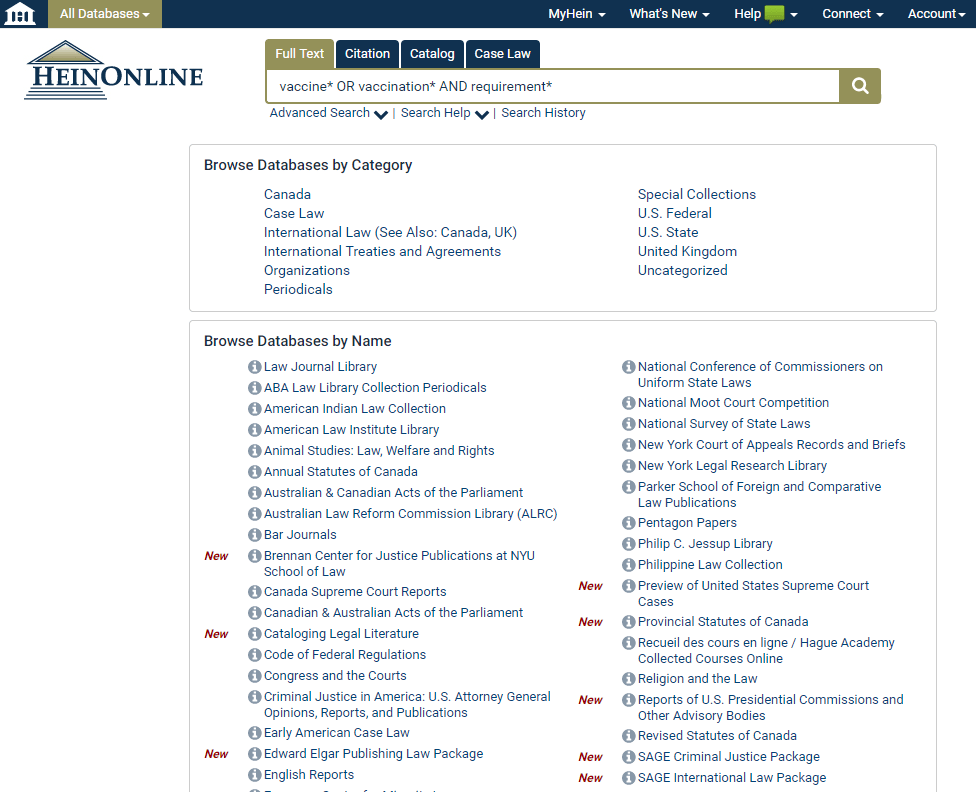
Results include several government documents and scholarly articles. There is information for both pro- and anti-vaccination views. For example, notice the article from the Boston College Law Review titled Vindicating the Vaccine: Injecting Strength into Mandatory School Vaccination Requirements to Safeguard the Public Health. Keep scrolling and view a comment from the Campbell Law Review titled Childhood Vaccinations and Autism: Does the National Childhood Vaccine Injury Act Leave Parents of Children with Autism Out in the Cold with Nowhere to Go?
Use the facets on the left side the results page to narrow down search results. For example, click on National Vaccine Injury Compensation Program under the Organization facet and choose the United States from the Location facet. Lastly, sort the articles by Number of Times Cited.This drastically narrows down search results
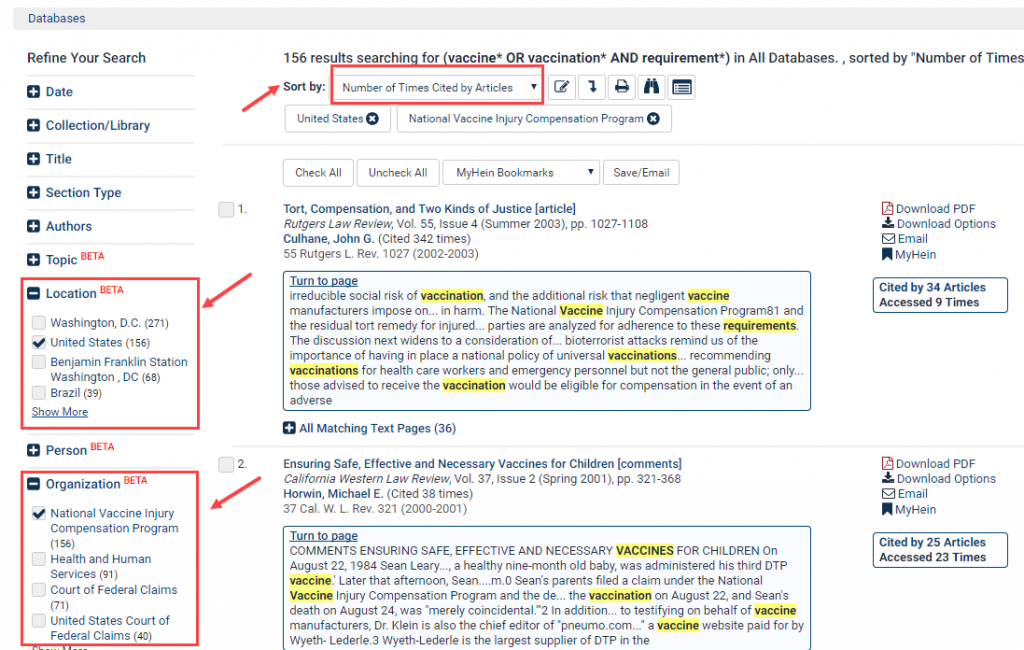
Use the ScholarCheck features on the right side of the results to find cited-by and accessed information. For example, find the article Balancing Consumer and Industry Interests in Public Health: The National Vaccine Injury Compensation Program and Its Influence during the Last Two Decades. The ScholarCheck feature provides users the ability to view the articles or cases which cite the specific article being viewed. Simply click on the hyperlink for the articles or the cases. Additionally, users can see how often this article was viewed in a rolling 12-month period.
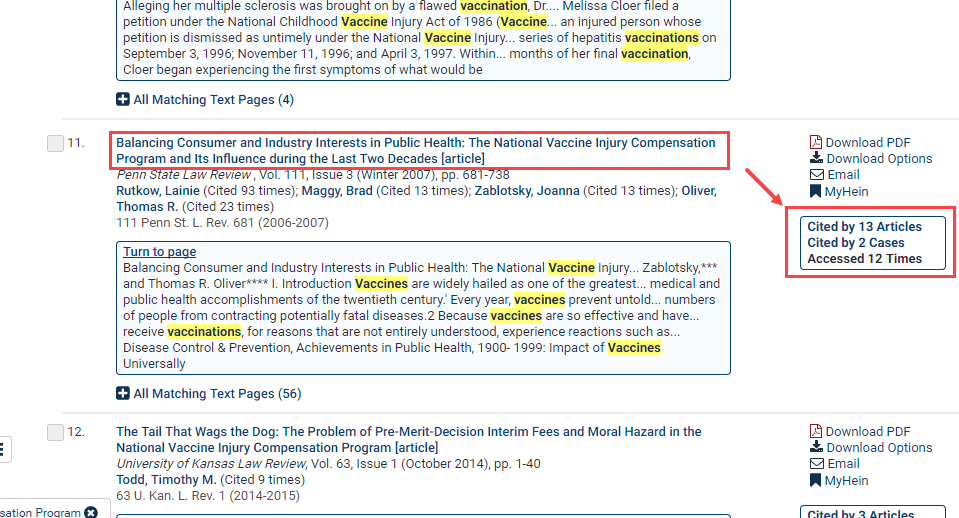
While viewing the article, click the More Like This button.
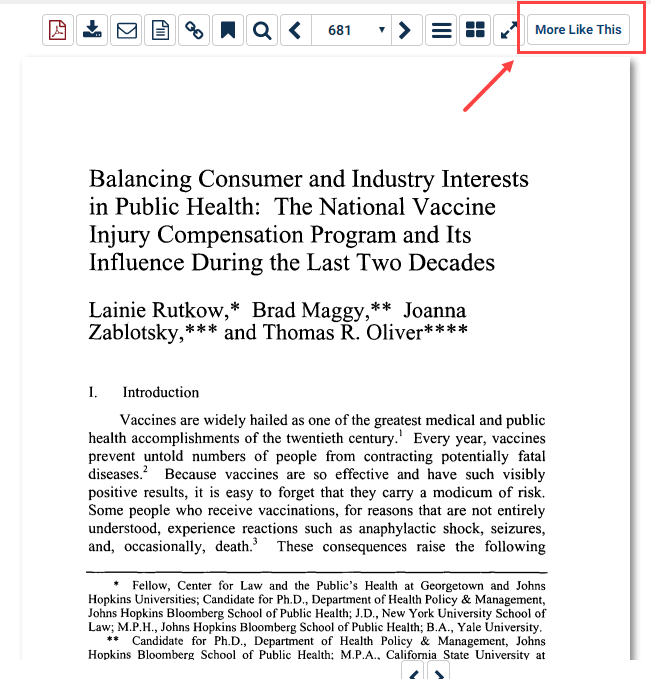
This tool uses a program which finds “interesting words” in an article, as determined by an algorithm that analyzes the article’s text, to produce similar articles based on those interesting words. Review the list of similar articles and adjust the boost factor, or enter new terms to change the scope of the results.
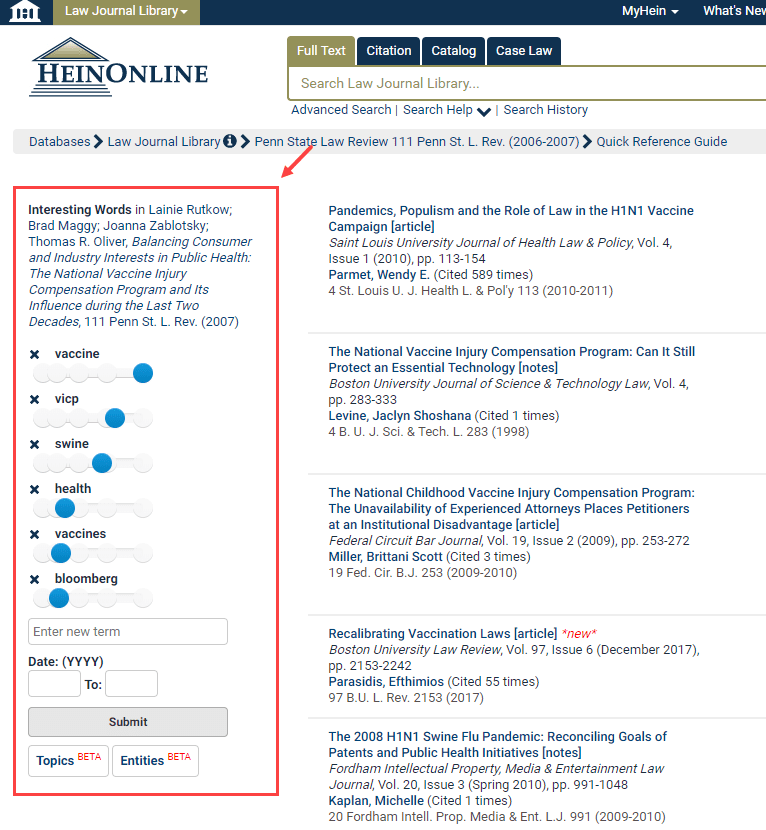
To further research this topic, enter the Catalog tab, found at the top of any database in HeinOnline within the search bar. Click the Subjects tool. This subject coding is at the title level and can be used to browse subjects and look for documents on a specific subject. These browsable subjects are driven from Cassidy Cataloging’s MARC records. Search for the word influenza.
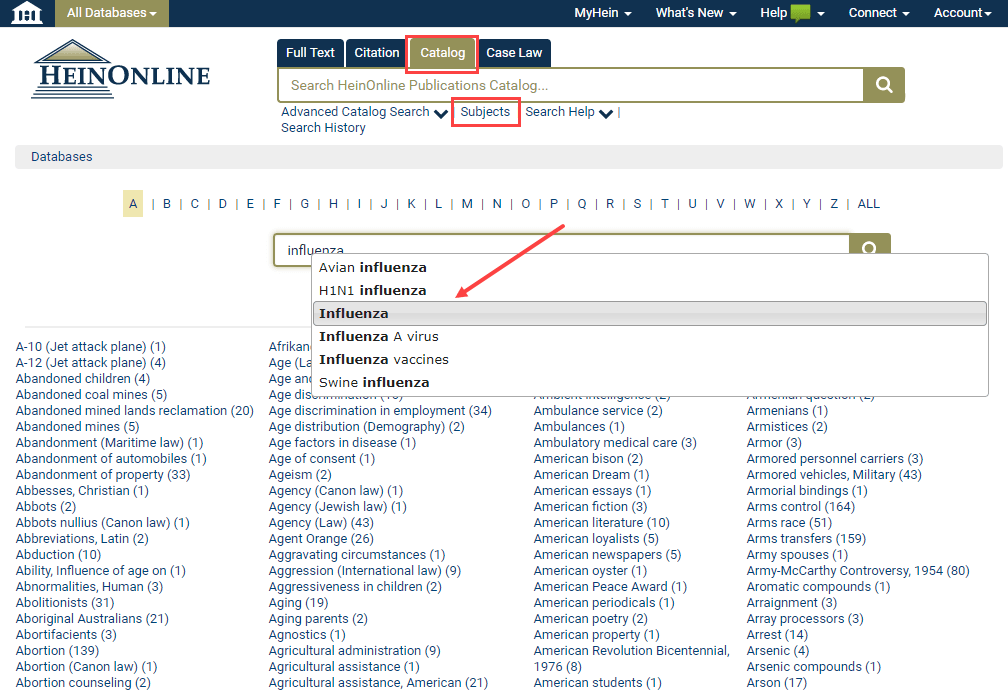
Results list all the titles in HeinOnline which are coded to the subject influenza.
Lastly, let’s conduct a proximity search. From the HeinOnline welcome page, using the Full Text tab, enter “H3N2 influenza”~10 and click the search button.
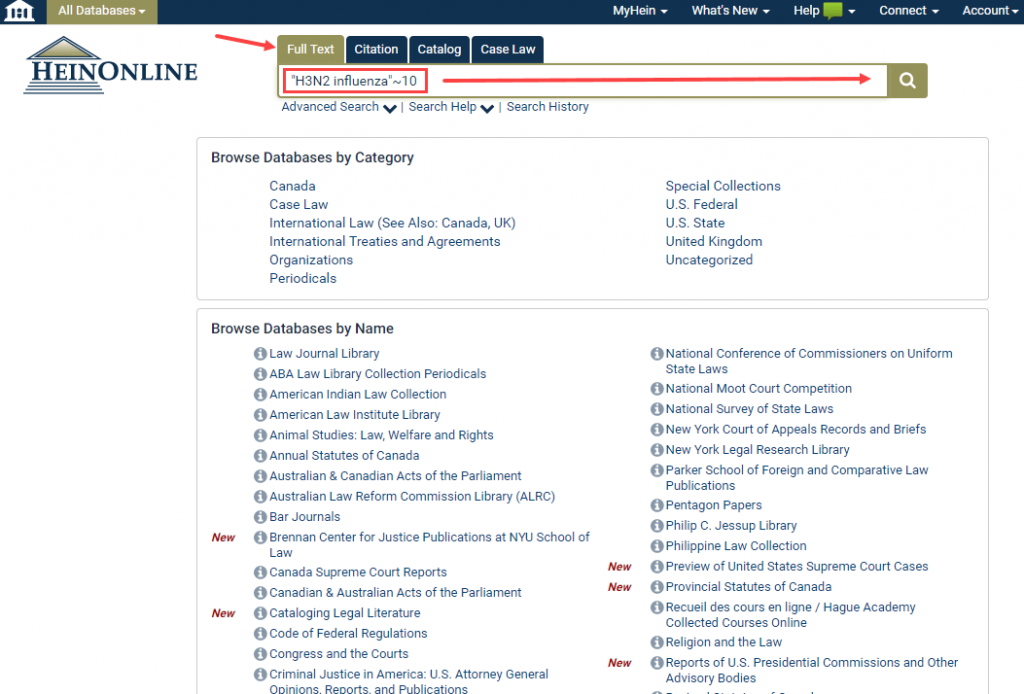
Refine the search results using the facets on the left side of the page. For example, choose 2010 to date in the Date facets to narrow down the results.
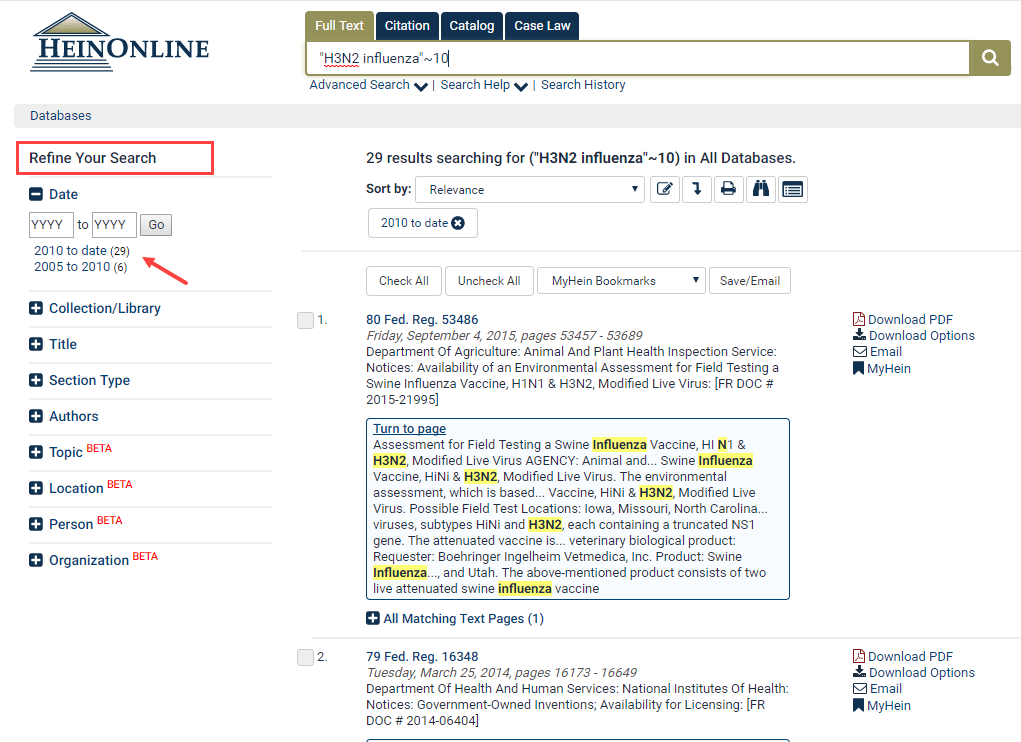
For help searching or navigating in HeinOnline, contact the dedicated support team at (800) 277-6995, by email, or live chat!



